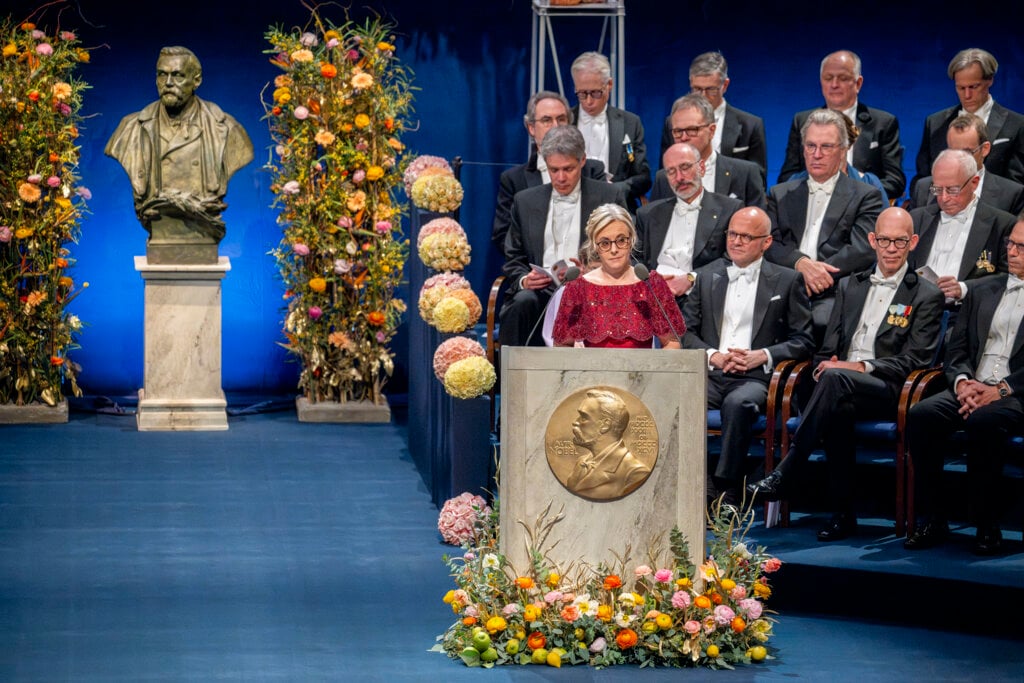Award ceremony speech

English
Swedish
Presentation Speech by Professor Gunilla Karlsson Hedestam, Member of the Nobel Assembly at Karolinska Institutet, Chair of the Nobel Committee for Physiology or Medicine, 10 December 2023.
Your Majesties, Your Royal Highnesses, Esteemed Nobel Prize Laureates, Ladies and Gentlemen,
DNA is the genetic blueprint that defines what we are − a fish, a honeybee, a lemon tree or a human. RNA is less well-known, but equally important. Messenger RNA, or mRNA, carries genetic information and acts as a template for protein production. Thousands of different mRNA molecules are present in each cell at any given time, instructing them how to develop and what functions to execute. Conversion of DNA to mRNA to protein is an evolutionary conserved process that is common to all forms of life.
Messenger RNA was first defined by Jacob and Monod in 1961, a discovery that was awarded a Nobel Prize in Physiology or Medicine in 1965. Although the identity and function of mRNA has been known for over 60 years, and mRNA is routinely used in most modern medical research laboratories, the term has remained largely obscure outside the scientific community − until recently.
This year’s Nobel Prize laureates in Physiology or Medicine − Professor Katalin Karikó and Professor Drew Weissman − have ensured that the term mRNA is now broadly recognised. Most of us present here today have received one or several mRNA vaccine doses in our arm, a process that directs our cells to produce the encoded protein for a short while. If the mRNA encodes a foreign virus protein, as in the case of the COVID vaccines, it will alert our immune system to stimulate responses against the virus, protecting us against disease should we later become infected.
RNA molecules are elegantly simple in their com- position, with just four building blocks – nucleotides − linked together in different order to encode any protein of interest. Katalin Karikó, an expert RNA biochemist, and Drew Weissman, a skilled immunologist, shared a vision of using mRNA as a generic carrier of information for clinical applications. But early results showed limited success. Karikó and Weissman realised that to achieve their goal, they needed to understand how our cells respond to different forms of RNA at the molecular level.
In a breakthrough discovery published in 2005, they demonstrated that mRNA produced with standard nucleotides evoked an undesired inflammatory response when delivered to human cells. They found that this reaction was circumvented when one of the four nucleotides was chemically modified to mimic our own mRNA. This finding provided a solution to a major problem previously facing mRNA-based clinical applications, propelling the mRNA technology into a new era.
The discovery by this year’s Nobel Prize laureates in Physiology or Medicine surprisingly enabled the development of effective vaccines that helped control a devastating pandemic and save millions of lives 15 years later. In 2020, the scientific community together with governments, the private sector, and regulatory authorities demonstrated that it is possible to greatly reduce the time needed for vaccine develop- ment in situations where this is urgently needed.
Science communication is challenging. A silver lining of the pandemic was the opportunity to increase public awareness and knowledge around infectious threats and how our immune system functions. Terms like mRNA, virus variants, antibodies, B cells and T cells are now well-known to most people, and surveys demonstrate that the public’s trust in scientific research increased during the pandemic. The basic research performed by the 2023 laureates no doubt contributed to this.
This year’s prize is very much in the spirit of Alfred Nobel’s will: a contribution to the greatest benefit of humankind.
Dear Professors Karikó and Weissman, on behalf of the Nobel Assembly at Karolinska Institutet, it is my great privilege to convey to you our warmest congratulations. I invite you now to step forward to receive the Nobel Prize from the hands of His Majesty the King.
Copyright © The Nobel Foundation 2023
Nobel Prizes and laureates
Six prizes were awarded for achievements that have conferred the greatest benefit to humankind. The 12 laureates' work and discoveries range from proteins' structures and machine learning to fighting for a world free of nuclear weapons.
See them all presented here.
